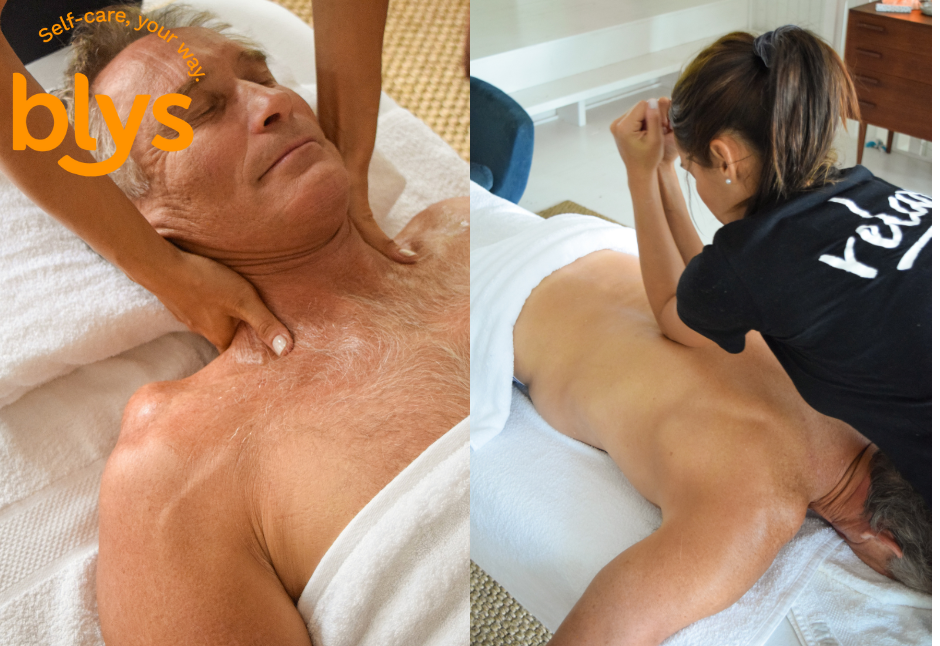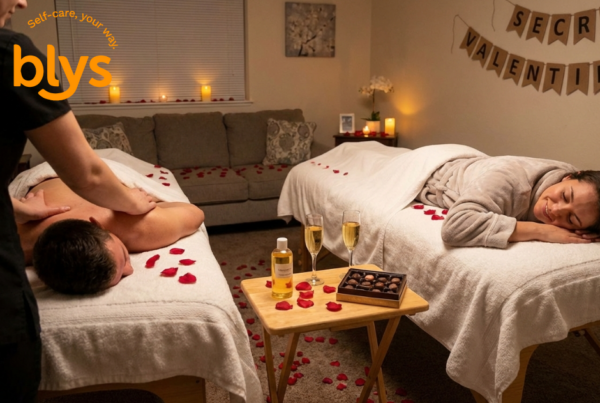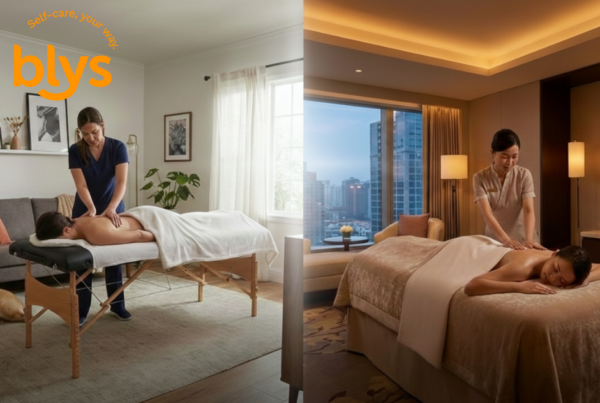
Choosing the right massage shapes how well your body recovers. Some days the problem is pain or tight muscles. Other days it’s stress, poor sleep, or mental fatigue. Knowing which massage suits your symptoms helps you get the right outcome, whether that’s easing discomfort or switching off your nervous system.
With Blys, you can access qualified remedial and relaxation therapists anywhere in Canada, delivered straight to your home. This guide breaks down both styles and gives you a simple way to decide what your body needs today: pain relief, deep calm, or a mix of both.
What Remedial Massage Actually Does
Remedial massage is designed to treat pain, tight muscles, and movement restrictions. It focuses on fixing what’s causing discomfort by working on specific soft-tissue tension and postural issues. Research shows remedial-style manual therapy can reduce muscle tightness and influence the body’s pain-modulation pathways, improving how the nervous system responds to pain.
Blys remedial therapists are Diploma-qualified and trained to assess your muscle concerns before starting treatment. Some also offer health fund rebates. With mobile sessions, you get targeted care at home.
For a closer look at what a mobile remedial session involves, the guide first-time remedial massage offers a simple walkthrough that complements this symptom-based guide.
What Relaxation Massage Actually Does
Relaxation massage focuses on calming the nervous system and helping the body shift into a parasympathetic, rest-and-digest state. This can lower cortisol, ease mental tension, and support deeper, more consistent sleep. Research shows that Swedish-style relaxation massage can significantly reduce stress and improve overall mood and relaxation levels.
It’s ideal for days when you feel overwhelmed, overstimulated, or mentally drained rather than physically injured.
With Blys, therapists bring relaxation treatments straight to your home, making it easier to unwind without travel.
If you want to dive deeper into how relaxation massage supports stress relief, Blys also has a quick guide on its benefits that pairs well with this comparison.
Simple Symptom Checker: What Your Body Is Telling You
Here’s the quickest way to decide which massage your body needs today.
If Your Main Issue Is Pain
Choose remedial when the discomfort feels structural or linked to movement. This includes sharp or persistent aches, tightness that restricts how you move, pain that travels to other areas, headaches triggered by muscle tension, or soreness that has increased after training or repetitive work.
Research shows that remedial-style manual therapy can reduce musculoskeletal pain by improving soft-tissue function and influencing the body’s pain-modulation pathways.
If Your Main Issue Is Stress or Burnout
Choose relaxation when the problem feels more emotional or mental than physical. Signs include racing thoughts, trouble switching off at night, stress-related headaches, irritability, or that wired, overstimulated feeling after a long week. Studies indicate that relaxation massage can help lower cortisol and improve overall mood and calmness.
If You Have Both Pain and Stress
Start with whichever symptom feels strongest. If pain affects your movement or daily tasks, it is usually best to start with remedial treatment. If overwhelm or exhaustion dominates, relaxation helps settle your system before any deeper work. Many Blys clients alternate both styles, using remedial for targeted relief and relaxation for nervous-system reset.
Book a remedial or relaxation massage with Blys and let a mobile professional come to you.
Quick Diagnostic Table
If you’re still unsure which massage your body needs today, this table gives you a simple way to match your symptoms with the style that delivers the best results. Use it as a quick reference before booking, especially on days when both stress and physical tension feel mixed together.
|
Symptoms |
Best Massage | Why It Helps |
| Neck pain or tight shoulders | Remedial |
Works on the underlying muscle dysfunction causing the discomfort. |
|
Anxiety with trouble sleeping |
Relaxation | Calms the nervous system and supports deeper rest. |
| Desk-posture tension with mental fatigue | Remedial first, then relaxation |
Releases tight muscles, then helps the body switch off. |
|
Heavy training week or increased workouts |
Remedial | Supports recovery and reduces load-related soreness. |
| Feeling overwhelmed or emotionally drained | Relaxation |
Lowers stress levels and helps settle the mind. |
This guide isn’t meant to be clinical — it’s a quick, practical way to choose the massage that matches how you feel right now. If your symptoms shift from week to week, alternating between remedial and relaxation can offer the most balanced support.
When to Choose Remedial Massage
Remedial massage is the better choice when pain or muscle dysfunction is getting in the way of daily movement. It works well for people who need targeted relief rather than general relaxation. Choose remedial if you notice:
- Slow training recovery, with muscles staying tight or sore longer than expected.
- Chronic tightness, especially when stretching or resting, no longer helps.
- Postural strain from desk work, causing stiff shoulders, upper-back tension, or neck discomfort.
- Mild injuries or restricted movement, like small strains or joints that feel “stuck”.
- RSI or tech neck, where repetitive tasks or screen time create persistent pain.
Research shows remedial-style manual therapy can reduce chronic musculoskeletal pain and improve function
When to Choose Relaxation Massage
Relaxation massage is the ideal option when stress, not pain, is driving how you feel. It’s best suited for days or weeks when your body feels tense from emotional or mental load rather than physical strain. Choose relaxation massage when you’re dealing with:
- Stress-heavy weeks where you feel mentally overloaded or on edge.
- Sleep problems, including shallow sleep or racing thoughts at night.
- Overthinking, especially when you can’t mentally switch off.
- Emotional exhaustion, irritability, or feeling easily drained.
Research shows relaxation-focused techniques can reduce cortisol and support deeper, more restorative sleep.
Relaxation massage at home with Blys helps your nervous system switch off quicker.
When You Can Safely Swap or Alternate Between Both
Many people benefit from using both styles at different times, depending on what their body is dealing with. A common rhythm is choosing relaxation massage during stress-heavy weeks, then switching to remedial when a monthly pain flare-up or tightness returns.
If you train regularly, alternating works well too: remedial for recovery after heavier sessions and gentler relaxation on lighter days to help your nervous system settle.
Because Blys lets you book either modality at home, it’s easy to adjust your routine without juggling clinic appointments or long travel times.
The simplest rule is to listen to your body. If the main issue changes, your massage style can change with it.
When to Avoid Massage or Seek Medical Advice
Massage isn’t always safe; sometimes it’s better to stop and consult a doctor. Avoid both remedial and relaxation massage if you have an acute injury, signs of infection, or a fever.
Unexplained swelling, sudden severe pain, or symptoms suggesting nerve compression — such as numbness, tingling, or weakness — also warrant medical review before booking a session.
If you’re unsure or already under treatment, it’s best to check with your GP or healthcare provider for clearance.
How Blys Makes Choosing the Right Massage Easier
Blys takes the guesswork out of picking the right massage by making both options simple and accessible. Therapists come directly to your home, so you can choose what your body needs without the stress of travel or clinic timetables.
If you need deeper, targeted work, Blys offers qualified remedial therapists who can spend longer sessions addressing specific tension. On lighter or high-stress days, relaxation massage is just as easy to book for a mental reset.
Each service page clearly explains what to expect, helping you feel confident about your choice before your therapist arrives.
Wrapping up
Choosing the right massage makes every session more effective, whether you need pain relief, deeper calm, or a mix of both. Using the symptom checker and paying attention to how your body feels on the day will help you get the results you’re actually looking for.
Some days call for remedial; others call for relaxation, and both have their place in a balanced routine.
If you’re ready to tune in to what your body needs, explore the full range of Blys massage services.




